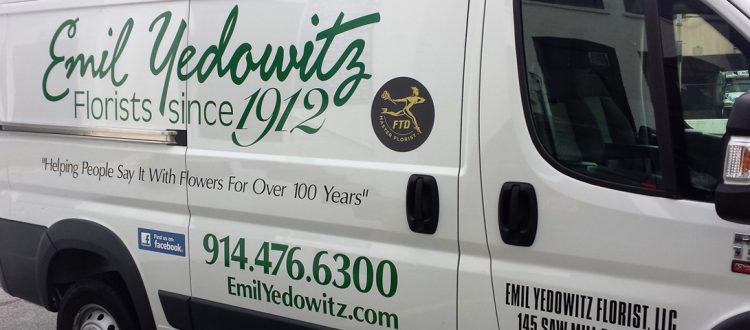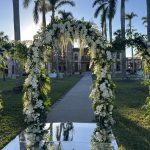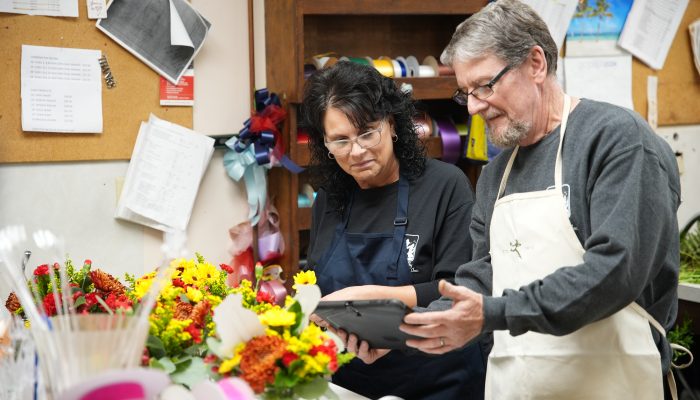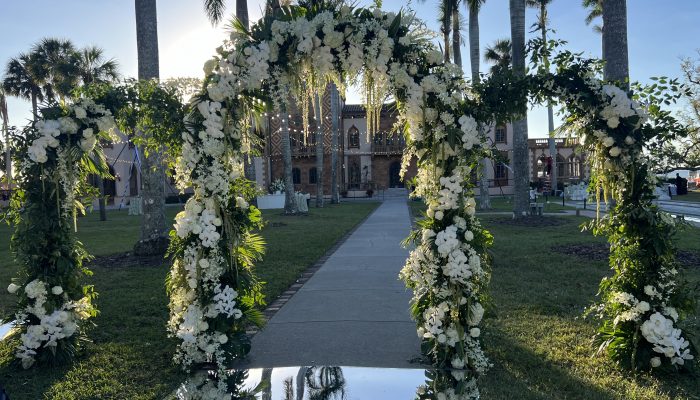FTD Featured Florist:
Emil Yedowitz Florist
Emil Yedowitz Florist, located in Yonkers, NY, is celebrating their 105th anniversary in 2017. What does it take to thrive for more than a century? We asked owner Bob Yedowitz for the secrets to his family business’s success.

Emil Yedowitz (front, seated) and his wife, Tecla, pose with their children Annie, Joseph, Arthur and Helen.
Congratulations on celebrating 75 years with FTD! Can you give us a brief overview of your business’s history?
We are a third-generation florist started by my grandfather in 1912. Emil Yedowitz was a Polish immigrant from the agricultural region of Galacia, where he apprenticed. He came to the United States in the early 1900s and worked on an estate in New Rochelle, NY, as a groundskeeper. He met his wife (also a Polish immigrant) in the United States and they married and had four children. He eventually saved enough money to purchase a couple of acres of land that included a small greenhouse in Yonkers, NY, where he grew cut flowers in season and sold them to florists in Westchester, Manhattan and the Bronx.
Eventually the second generation became involved in the business and built five greenhouses and a flower shop. Now we were in the wholesale and retail business, and Emil Yedowitz Florist was soon one of the largest retail flower shops in Westchester County. We also owned and operated a 500-acre Christmas tree farm in Somerset County, Maine, from the 1930s to mid-1970s.
When South American product became available to florists, we retreated from the wholesale cut flower business and changed our wholesale crops over to seasonal potted plants, garden annuals, perennials, vegetable transplants, etc. Eventually the third generation (Joe and Bob Yedowitz) stopped wholesaling altogether and dedicated our greenhouse facilities to the retail market with an expansion of a garden center. With the retirement of the second generation, the third generation took over full management in the late 1960s.

In 2010 we sold all of the property to a developer and Joe retired to Florida. Bob (who was also the grower for nearly 50 years) continued the retail flower business, moving to a commercial space in Yonkers where we have been for the last seven years, celebrating our 105th year in business this year. I think if there is one ideal that we continue to follow today, it is to be honest with your customers and always deliver a quality product and service at a fair price.
To what do you attribute your business’s longevity?
By virtue of being in business for 105 years, our firm has gone through every depression and recession to date and it has not always been easy to keep things together. Had the second generation remained wholesale only and not gone into the retail flower business, the firm might not have made it through the Great Depression. Had the third generation not reinvented themselves by expanding the garden center business, we might not still be in business. Had I not sold the greenhouse property, I most probably would not still be in business. Just like most retail businesses, the flower business is constantly changing. After 50 years in the flower industry, there is one rule to remember. As the character Gunnery Sargent Tom “Gunny” Highway drilled into his troops in the movie Heartbreak Ridge, “Improvise, adapt and overcome.” That’s the secret in a nutshell.

Another factor that contributed to the growth of our business was our community involvement. In the early days of our retail business, my father, uncle and aunt were extremely active in our city, with memberships in our local Lions Club, Kiwanis Club and Soroptimist International. They were also very involved in our parish church organizations. That was how you got your name out and made personal contacts with potential customers. When my brother and I came into the business, we also joined the Exchange Club and Lions Club. I was also very involved with our local 4-H club as a volunteer adviser to an urban vegetable gardening program conducted by the Cornell Cooperative Extension Service of Westchester County.
 All of our family was involved in floral industry organizations like The New York FTD Region, The New York Florist Club, The Metropolitan Retail Florists Association, SAF, The New York State Retail Florist Association and The New York State Growers Association. Sadly, most of our industry organizations no longer exist, but 75 years ago that was how you grew a local business and gained valuable information from other florists and industry organizations that you could adapt to your own business.
All of our family was involved in floral industry organizations like The New York FTD Region, The New York Florist Club, The Metropolitan Retail Florists Association, SAF, The New York State Retail Florist Association and The New York State Growers Association. Sadly, most of our industry organizations no longer exist, but 75 years ago that was how you grew a local business and gained valuable information from other florists and industry organizations that you could adapt to your own business.
Drawing from my horticultural experience, I also freelanced for our local cable television news station by producing four-minute segments on gardening (in season), care and handling of cut flowers and environmental subjects. I was on air every week for 20 years, which helped bring a lot of attention to our garden center and florist business. In the process of being on air, my segments won me four New York News Emmy nominations and two Emmy awards. I was also contracted by the Netherlands Flower Bulb Information Center to produce 20 one-minute segments, which aired across the country in 2000.
What made you want to become a florist? How long have you worked in floristry?
Officially I have worked in the flower business for 50 years, but actually I was raised in the flower business. When we were small kids, our winter playground was under the growing benches in the greenhouses, and with our parents at the flower shop, especially during the holidays. I didn’t know it then but that’s how I learned the business. We watched our parents work, making flower arrangements, funeral pieces and wedding flowers. That was our training ground. However, out of eight children in two families, my brother and I were the only ones that stayed in the business and I will probably be doing this until I am no longer able.

My daughter Trish works for me from her home in Colorado. She handles all our email marketing and our Facebook page. We use an Internet phone system and Trish also answers the phones from 2-5 p.m. Eastern time (12-3 p.m. Mountain). The phone system also has an intercom feature that allows her to speak with anyone in our shop in Yonkers with the push of a button. She also has a Mercury terminal in her office, so she can take an order in Colorado and have it print out in our office in Yonkers. This allows my local phone staff to leave early in the afternoon and be home when their kids get home from school. Trish also works the phones extra hours on the holidays from Colorado. My office manager also has an Internet phone in her home office and can work from home if needed.
What do you enjoy most about being a florist?
There was always a great satisfaction from working with flowers in the flower shop and growing plants in our greenhouses. It’s hard work, and not for everyone but for me it was a way to channel my creativity. It’s said that you should follow your passion. For me it has been the flower business.

Current Emil Yedowitz Florist designers Ilse (left) and Carla.
Are there any current floral trends that really excite you?
I believe we should pay attention to trends, but trends are just that. Many design styles that are currently being featured in magazines and on websites are just recycled ideas with a new twist. What I do get excited about is when cut flower growers develop new or improved varieties of flowers for us to use in our floral designs. An example are the Star and Solomio Dianthus that have become available to us through the FTD Flower Exchange. I believe that customers respond more to different types of flowers and colors than they do to trendy arrangement styles.
What advice do you have for florists looking to attract new customers?
Wow, that’s a tough one. With all the competition out there, the task of attracting new business may seem daunting, but believe there is still new business to be had. We always had some holiday church business, but back in the ‘70s I aggressively went after more of that business and to this day we still service between forty and fifty churches in the New York Metro area with altar vases and flowering plant material for Christmas and Easter, including Cataractarum Palm trees and vases of cut Areca Palm for Palm Sunday services. This type of business does require that you have a real understanding of the liturgical calendar, the liturgy itself, and a sense of the seasonal elements used in the worship environment in order to offer decorating ideas to a church pastor and hopefully make the sale.
Of course, keeping a sale is another issue. You need to provide excellent service and a quality product that differentiates you from the big box stores. Otherwise, they don’t need you. The same applies to everyday sales. Recently we made some connections with golf clubs and have been the recipient of some excellent business from the clubs. They start in March with centerpieces for their St. Patrick’s Day dinner, then Easter, Mother’s Day, Fourth of July, wine dinners, golf dinners, pool dinners, luncheons, Christmas parties and New Year’s Eve, plus some wedding work and even funeral pieces. It’s not easy to get connected to a golf club or country club, but even one good club can be extremely lucrative.
What do you value most about your partnership with FTD?
 We have been a member of FTD for 75 years, and for majority of those years we have been FTD only. Over the years, our association with FTD has been very rewarding from the educational programs, to technology, to providing us with quality orders that we can actually make money on. Now the FTD Flower Exchange offers us the ability to purchase wholesale flowers from more than 50 growers in South America and California, offering many items that you just can’t get from our local wholesaler. I can say our relationship with FTD has been part of our success over the years.
We have been a member of FTD for 75 years, and for majority of those years we have been FTD only. Over the years, our association with FTD has been very rewarding from the educational programs, to technology, to providing us with quality orders that we can actually make money on. Now the FTD Flower Exchange offers us the ability to purchase wholesale flowers from more than 50 growers in South America and California, offering many items that you just can’t get from our local wholesaler. I can say our relationship with FTD has been part of our success over the years.
















